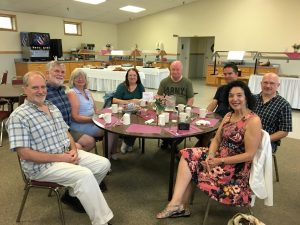 Ephesians 4:1
Ephesians 4:1
Therefore I, the prisoner for the Lord, urge you to walk worthy of the calling you have received… (HCSB)
Almost every time Sharon and I go for a walk, one of us asks, “Where do you want to walk?” It is a valuable question for friendship. It is good to listen the other’s ideas, moods, and desires. To teach the Christian way of life to his readers, Paul often used the metaphor “walk”. As we live in friendship with the Lord, we ought to listen to his preferences about the places where he wants to walk with us. Every follower of Christ knows that we make rather poor choices about where to walk. Because of his greatness, holiness, and wisdom and our deficiencies in these qualities, we need to listen to his good choices about where we should walk.
As we approach the year 2017, it is worthwhile to ponder where we must walk to please the Lord. In the letter to the Ephesians, the apostle presents much of his ethical teaching through this illustration. Let’s glance at the “trail map” to find out where the Lord wants us to walk in him and through him and by him.
- Walk worthy of your calling (4:1). The first trail leads up to a lofty place, the calling to hope (confident expectation) of our glorious inheritance (1:18). Our Lord wants us to walk near to heaven, confident and our eyes set on the prize. We should aspire for eternal glory. When you read the Gospels attentively, you will discover the importance of this idea in the teachings of our Lord.
- Walk no longer as the nations walk (4:17). The second trail leads away from where the peoples of the nations of this world like to walk. It seems a poor choice to them, but those in the Messiah know that their trails are destructive and futile (4:17-19). To walk with the Lord Jesus requires that we deliberately turn from the paths of the nations.
- Walk in love (5:2). The third trail leads to the imitation of God. It is the trail of love, of setting your affections on God and others, so that you give yourself sacrificially for their good. To walk this trail is costly to self-love; for that reason, it is despised. Think and feel the description of love’s actions (1 Corinthians 13:1-7 HCSB): Love is patient, love is kind. Love does not envy, is not boastful, is not conceited, does not act improperly, is not selfish, is not provoked, and does not keep a record of wrongs. Love finds no joy in unrighteousness but rejoices in the truth. It bears all things, believes all things, hopes all things, endures all things. The only way to love this way is to pick up your cross and follow Him (Mark 8:34).
- Walk as children of light (5:8). Light involves knowing the truth and acting the truth. As we genuinely shine for the Lord, we will expose the evil in others. Yet, we will also produce the pleasant-to-the-Lord fruit of goodness, righteousness, and truth. There is also the pleasant by-product of being unashamed.
- Walk as wise, not as unwise (5:15). Wisdom is skill in godly wisdom. It is knowing how to practice the truth in fellowship with the truth. This necessitates being filled with the Spirit.
The practical question for each of us is “This coming year, do I want to walk where the Lord wants me to walk?” There really is no value, in fact, it is harmful, to continue to make our poor choices where we are not walking with the Lord. Sit down with the “trail map”, alone and with some friends, and think through the places that the Lord wants to go with us. Choose his paths in 2017.
Grace and peace, David

 1 Thessalonians 5:11
1 Thessalonians 5:11 2 Corinthians 7:2-4
2 Corinthians 7:2-4